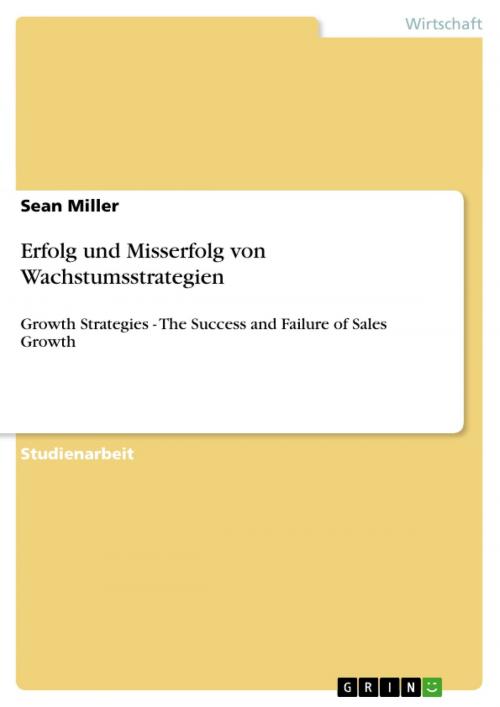Erfolg und Misserfolg von Wachstumsstrategien
Growth Strategies - The Success and Failure of Sales Growth
Business & Finance, Economics, Economic Development| Author: | Sean Miller | ISBN: | 9783640910595 |
| Publisher: | GRIN Verlag | Publication: | May 5, 2011 |
| Imprint: | GRIN Verlag | Language: | German |
| Author: | Sean Miller |
| ISBN: | 9783640910595 |
| Publisher: | GRIN Verlag |
| Publication: | May 5, 2011 |
| Imprint: | GRIN Verlag |
| Language: | German |
Studienarbeit aus dem Jahr 2010 im Fachbereich VWL - Konjunktur und Wachstum, , Sprache: Deutsch, Abstract: 1. Introduction More than ever corporate growth is a central topic in the business management debate of research and corporate practice. Indicators for that are the great numbers of newly released books on this topic as well as the fact that growth is the main theme of almost every annual general meeting. The bigger significance of corporate growth is related to the fact that sustainable performance increases can only be achieved by positive changes in a company. As a consequence, many managers feel corporate growth is the solution. However, growth is not a universal remedy. It is very decisive how the company grows. The initial situation of a company, the direction of growth, the availability of management capacities as well as the height and the consistency of growth has to fit together, in order for the strategy to be successful. Growth strategies of companies can have different objectives. They can aim at improving their product innovation, increasing in diversification, internationalization, raising customer figures and sales2. The primary goal of companies is to achieve growth of sales in combination with growth of profits. Hereto, Allan Stewart, former CEO of the billion-dollar company GTE in Stanford (USA) said: 'Holen wir zuerst den Umsatz, dann machen wir ihn profitable'3. This paper will examine growth strategies in the context of sales increases. At the beginning 'corporate growth as a strategy' will be assessed, which is vital for the further discussion. However, the main focus is on the implementation of sales growth strategies and therefore I assume a successful company is seeking to increase its sales in the medium-term. Similarly, I will look at circumstances that may jeopardize sales increases.
Studienarbeit aus dem Jahr 2010 im Fachbereich VWL - Konjunktur und Wachstum, , Sprache: Deutsch, Abstract: 1. Introduction More than ever corporate growth is a central topic in the business management debate of research and corporate practice. Indicators for that are the great numbers of newly released books on this topic as well as the fact that growth is the main theme of almost every annual general meeting. The bigger significance of corporate growth is related to the fact that sustainable performance increases can only be achieved by positive changes in a company. As a consequence, many managers feel corporate growth is the solution. However, growth is not a universal remedy. It is very decisive how the company grows. The initial situation of a company, the direction of growth, the availability of management capacities as well as the height and the consistency of growth has to fit together, in order for the strategy to be successful. Growth strategies of companies can have different objectives. They can aim at improving their product innovation, increasing in diversification, internationalization, raising customer figures and sales2. The primary goal of companies is to achieve growth of sales in combination with growth of profits. Hereto, Allan Stewart, former CEO of the billion-dollar company GTE in Stanford (USA) said: 'Holen wir zuerst den Umsatz, dann machen wir ihn profitable'3. This paper will examine growth strategies in the context of sales increases. At the beginning 'corporate growth as a strategy' will be assessed, which is vital for the further discussion. However, the main focus is on the implementation of sales growth strategies and therefore I assume a successful company is seeking to increase its sales in the medium-term. Similarly, I will look at circumstances that may jeopardize sales increases.















